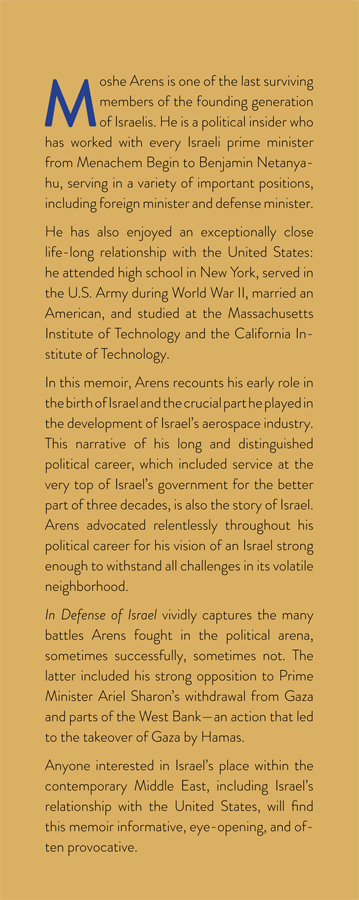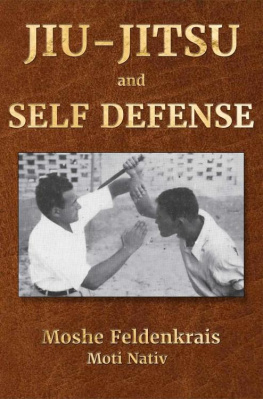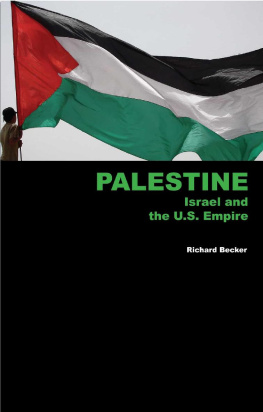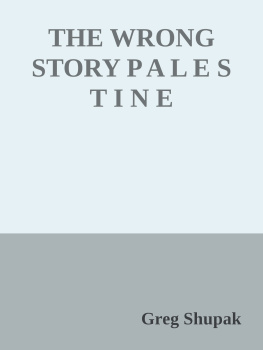Moshe Arens - In Defense of Israel
Here you can read online Moshe Arens - In Defense of Israel full text of the book (entire story) in english for free. Download pdf and epub, get meaning, cover and reviews about this ebook. year: 2018, publisher: Brookings Institution Press, genre: Politics. Description of the work, (preface) as well as reviews are available. Best literature library LitArk.com created for fans of good reading and offers a wide selection of genres:
Romance novel
Science fiction
Adventure
Detective
Science
History
Home and family
Prose
Art
Politics
Computer
Non-fiction
Religion
Business
Children
Humor
Choose a favorite category and find really read worthwhile books. Enjoy immersion in the world of imagination, feel the emotions of the characters or learn something new for yourself, make an fascinating discovery.
- Book:In Defense of Israel
- Author:
- Publisher:Brookings Institution Press
- Genre:
- Year:2018
- Rating:5 / 5
- Favourites:Add to favourites
- Your mark:
- 100
- 1
- 2
- 3
- 4
- 5
In Defense of Israel: summary, description and annotation
We offer to read an annotation, description, summary or preface (depends on what the author of the book "In Defense of Israel" wrote himself). If you haven't found the necessary information about the book — write in the comments, we will try to find it.
In Defense of Israel — read online for free the complete book (whole text) full work
Below is the text of the book, divided by pages. System saving the place of the last page read, allows you to conveniently read the book "In Defense of Israel" online for free, without having to search again every time where you left off. Put a bookmark, and you can go to the page where you finished reading at any time.
Font size:
Interval:
Bookmark:

IN DEFENSE OF ISRAEL
A Memoir of a Political Life
MOSHE ARENS
BROOKINGS INSTITUTION PRESS
Washington, D.C.
Copyright 2018
THE BROOKINGS INSTITUTION
1775 Massachusetts Avenue, N.W., Washington, D.C. 20036
www.brookings.edu
All rights reserved. No part of this publication may be reproduced or transmitted in any form or by any means without permission in writing from the Brookings Institution Press.
The Brookings Institution is a private nonprofit organization devoted to research, education, and publication on important issues of domestic and foreign policy. Its principal purpose is to bring the highest quality independent research and analysis to bear on current and emerging policy problems. Interpretations or conclusions in Brookings publications should be understood to be solely those of the authors.
Library of Congress Cataloging-in-Publication data
Names: Arens, Moshe, author.
Title: In defense of Israel : a memoir of a political life / Moshe Arens.
Description: Washington, D.C. : Brookings Institution Press, [2018] | Includes index.
Identifiers: LCCN 2017020199 (print) | LCCN 2017021698 (ebook) | ISBN 9780815731429 (ebook) | ISBN 9780815731412 (cloth : alk. paper)
Subjects: LCSH: Arens, MosheDiaries. | StatesmenIsraelBiography. | Aeronautical engineersIsraelBiography. | IsraelPolitics and Government20th century.
Classification: LCC DS126.6.A735 (ebook) | LCC DS126.6.A735 A3 2018 (print) | DDC 956.9405/4092 [B]dc23
LC record available at https://lccn.loc.gov/2017020199
ISBN 978-08157-3141-2 (cloth : alk. paper)
ISBN 978-08157-3142-9 (ebook)
9 8 7 6 5 4 3 2 1
Typeset in Adobe Caslon Pro
Composition by Westchester Publishing Services
Contents
Preface
My story begins with a description of the events that took place in the Rumbula Forest, near Riga, Latvia, in November 1941. It was the beginning of the German extermination of Latvias Jewish community. I was not there, but I might have been: I had left Latvia for the United States on September 7, 1939, a few days after the outbreak of World War II on September 1. I have lived with the image of Rumbula for many years; it underlies my determination that the Jewish people should never again be defenseless. I have devoted most of my adult life to doing what I can to strengthen Israel. This book is my story.
By profession I am an engineer. My professional career was devoted to the development of aeronautical engineering in Israel. As a founding member of the Department of Aeronautical Engineering at Israels Institute of Technology, called the Technion, in Haifa, and as vice president of engineering at Israel Aerospace Industries, I played a leading role in educating a generation of Israeli aeronautical engineers and in providing the Israel Defense Forces with aircraft and missiles that would give it a qualitative advantage over the weapons fielded by Israels enemies.
As defense minister I had the opportunity to shape Israels defense policy: funding Israeli weapons system development projects, sending Israeli satellites into space, and making Israel fairly independent in supplying its armed forces with the equipment they required. I steered Israel through the First Gulf War, in 199091, and promoted the development of active missile defense technology. I introduced a number of reforms in the Israel Defense Forces to better prepare them for modern warfare. As foreign minister I sought ways to bring peace to Israel, a most difficult task in the Middle Eastern environment. Over the years Israel has become stronger, and some of the threats directed against the country at its birth have receded. I was privileged to be able to contribute to that process.
I end my story with a review of my research on the Warsaw ghetto uprising. After retiring from politics, freed of my obligations as defense minister, I took the opportunity to attempt to understand what happened during the Holocaust and under what circumstances Jewish resistance was possibleeven though desperate and without hope of victory.
The existence of a strong State of Israel provides the assurance that what happened during the Holocaust cannot happen again.
Rumbula
On November 30, 1941, the first column composed of elderly men, women, and children, accompanied by fifty guards, was marched out of the Riga ghetto at 6:00 a.m. It was a cold winter morning, 7 degrees below freezing. The previous evening there had been a light snowfall. Not everyone could keep up with the pace set by the guards, and the column began stretching out, the oldest and weakest falling behind. Anyone not keeping up or stopping to rest was shot on the spot by the guards. Along the path followed by the column could now be seen the dead and the wounded. Spots of the victims blood began to cover the snow.
Two days earlier the able-bodied men in the ghetto had been ordered into a four-block enclosure cordoned off by barbed wire, leaving the women, children, the elderly, and the infirm in the remaining ghetto area. It was from among them that a group had now been formed into columns and was being marched in the direction of the Rumbula Forest.
It was ten kilometers from the ghetto to the execution site chosen by the Germans on the edge of the forest. The first column arrived at Rumbula after three hours. The people were ordered to undress and deposit their clothing and valuables in designated locations. Dressed only in their underwear, they were then led to pits that had previously been prepared by Russian prisoners of war. In single file, ten at a time, they were ordered into the pits, where they were shot, falling on top of the bodies of those who had preceded themmany of those already in the pits still alive.
Fifteen thousand Jews from the Riga ghetto were killed on that murderous day, to be followed by another 10,000 eight days later. The executions had been planned and overseen by Friedrich Jeckeln, commander of SS Einsatzgruppe A. The Einsatzgruppen , literally task forces, were death squads that followed the German army as it advanced into the Soviet Union and were tasked with killing the Jews in the areas that had fallen under German control.
I was not there that day, although I might have been, together with my mother, Roza, and my younger sister, Miriam. We escaped the fate of the Jewish community of Riga, among them many of my friends and schoolmates, because my father, Tevye, an enterprising industrialist, was in New York with my older brother, Richard, when World War II broke out. Concerned for our fate in war-torn Europe, he cabled us to join him and my brother immediately in America. So on September 7, 1939, seven days after the German invasion of Polandthe Baltic countries as yet untouched by the warwe took a flight from Riga to Stockholm, and in the Swedish port of Gteburg boarded the SS Drotningholm for our journey to New York, landing there in late September.
On that bloody day in Rumbula I was attending George Washington High School in the Washington Heights section of Manhattan, completely unaware of what was happening that day in Riga, the city in which I had grown to adolescence. Only some years later, as the dimensions of the Holocaust became apparent and details of the killings were published, did I learn the fate of the Jewish community in Riga. Since then, the scenes of the murders committed at Rumbula have haunted my thoughts almost as if I had been there. Hardly a day goes by that these thoughts do not enter my mind, accompanied by a feeling that a special obligation was imposed on me, as a survivor of the Holocaust, to do whatever I could to contribute to the security and safety of my people, the Jewish people. The German murder machine aimed at exterminating the Jews of Europe had also been directed at me and my whole family, and our good fortune had been to leave while there was still time. I have attempted to focus on that obligation for most of my life, so that what happened at Rumbula, at Babi Yar, in the Warsaw ghetto, at Treblinka and Auschwitz, and at the thousands of other locations in Europe where six million Jews were murdered by the Germans and their collaborators during the Holocaust, while the world stood by, could never happen again.
Font size:
Interval:
Bookmark:
Similar books «In Defense of Israel»
Look at similar books to In Defense of Israel. We have selected literature similar in name and meaning in the hope of providing readers with more options to find new, interesting, not yet read works.
Discussion, reviews of the book In Defense of Israel and just readers' own opinions. Leave your comments, write what you think about the work, its meaning or the main characters. Specify what exactly you liked and what you didn't like, and why you think so.








